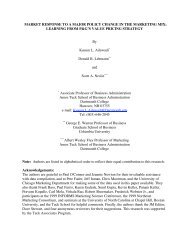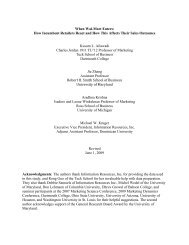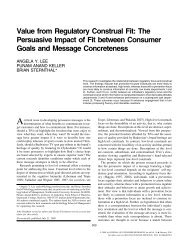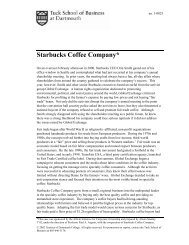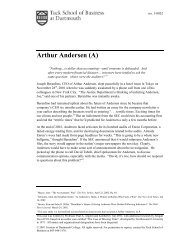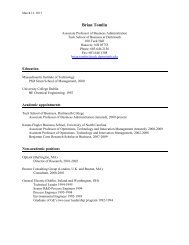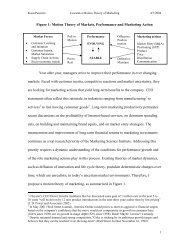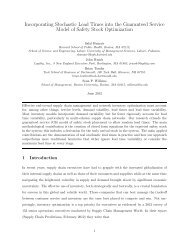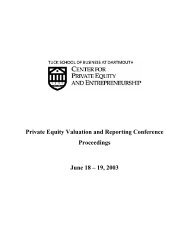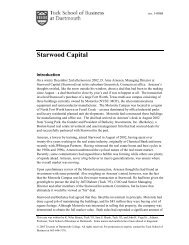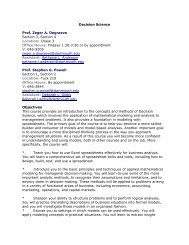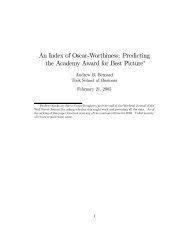tax notes international - Tuck School of Business - Dartmouth College
tax notes international - Tuck School of Business - Dartmouth College
tax notes international - Tuck School of Business - Dartmouth College
You also want an ePaper? Increase the reach of your titles
YUMPU automatically turns print PDFs into web optimized ePapers that Google loves.
BOOK REVIEW<br />
smaller government. But the authors are more optimistic<br />
than the critics: They keep their fingers crossed that<br />
future installments <strong>of</strong> <strong>tax</strong> competition will eventually<br />
‘‘starve the beast.’’ Count me a skeptic. Given demographic<br />
aging in all OECD countries and sharp income<br />
inequalities among the elderly, it seems doubtful that<br />
<strong>tax</strong> competition will curtail entitlement spending. Indeed,<br />
entitlement spending could easily double over the<br />
next generation, with medical care accounting for most<br />
<strong>of</strong> the expansion. In the contest between <strong>tax</strong> cuts and<br />
grandmother’s heart surgery, guess who wins.<br />
For me, the compelling argument for <strong>tax</strong> competition<br />
is that it serves to align fiscal charges with public<br />
benefits — just as that hero <strong>of</strong> public finance, Charles<br />
Tiebout, described a half century ago. Tiebout, <strong>of</strong><br />
course, was talking about local governments. But in the<br />
face <strong>of</strong> rising <strong>tax</strong> competition, many national governments<br />
have not only reformed their <strong>tax</strong> systems but<br />
also have enhanced the business environment by improving<br />
transportation, power grids, telecommunications,<br />
schools, hospitals, and museums.<br />
Given the virtues <strong>of</strong> <strong>tax</strong> competition, Edwards and<br />
Mitchell condemn attempts to harmonize national <strong>tax</strong><br />
systems, led by the OECD and the European Union.<br />
In fact, the anti-<strong>tax</strong>-competition crowd has gradually<br />
lost its voice in recent debates. However, it seems<br />
wrong to dismiss wholesale the arguments advanced<br />
for <strong>tax</strong> harmonization.<br />
One subject where I agree with the <strong>tax</strong> harmonization<br />
school is the need to share information on investments<br />
by nonresidents between the host country and<br />
the home country. In the Cato view, the creation <strong>of</strong><br />
efficient reporting networks will suppress <strong>tax</strong> competition.<br />
That’s true, if the term ‘‘<strong>tax</strong> competition’’ is<br />
stretched to encompass means <strong>of</strong> furthering <strong>tax</strong> evasion.<br />
But my belief is that the country <strong>of</strong> citizenship or<br />
residence <strong>of</strong> natural persons has the right to <strong>tax</strong> their<br />
worldwide income if it chooses; accordingly, capital<br />
income earned abroad should be reported by the host<br />
country as a matter <strong>of</strong> comity between nations.<br />
This issue is closely related to an important but <strong>of</strong>ten<br />
overlooked question: Do the virtues <strong>of</strong> <strong>tax</strong> competition<br />
apply with equal force to personal income <strong>tax</strong>ation<br />
as to corporate income <strong>tax</strong>ation? That’s where Tiebout<br />
entered the debate, with the metaphor <strong>of</strong> disaffected<br />
citizens ‘‘voting with their feet.’’ But citizens cannot<br />
change nationality as easily as residence; and in some<br />
countries, the rights and privileges associated with citizenship<br />
are extremely valuable. Against this factual<br />
background, I think it’s an open question whether unfettered<br />
<strong>tax</strong> competition is appropriate in the realm <strong>of</strong><br />
personal <strong>tax</strong>ation.<br />
Edwards and Mitchell have written a most entertaining<br />
book — not an easy feat when the subject is <strong>tax</strong>ation.<br />
Casual readers will enjoy stories about celebrities<br />
— Ringo Starr <strong>of</strong> Beatles fame, Irish rock band U2,<br />
Swedish pop group ABBA, and others — who have<br />
channeled their wealth and royalties to <strong>tax</strong> haven jurisdictions.<br />
Policy wonks will appreciate the comprehensive<br />
surveys <strong>of</strong> <strong>tax</strong> reform. There’s something for<br />
everyone — even the Obama team and its congressional<br />
allies. ◆<br />
416 • FEBRUARY 2, 2009 TAX NOTES INTERNATIONAL<br />
(C) Tax Analysts 2009. All rights reserved. Tax Analysts does not claim copyright in any public domain or third party content.



